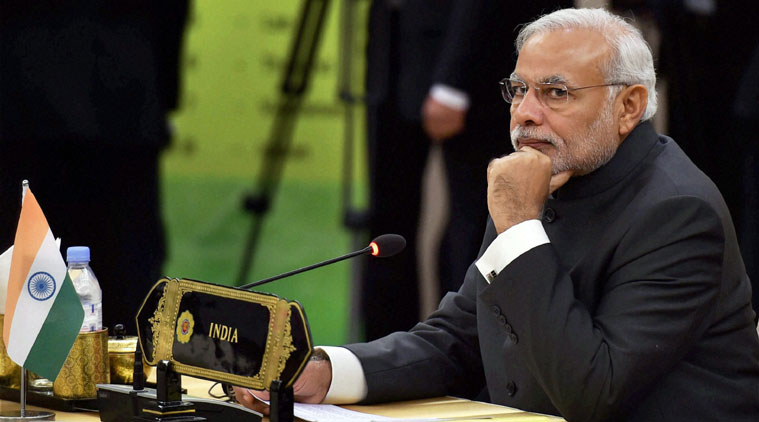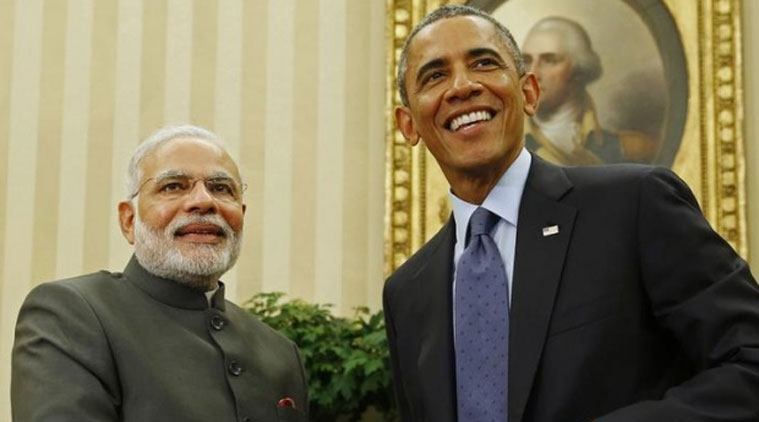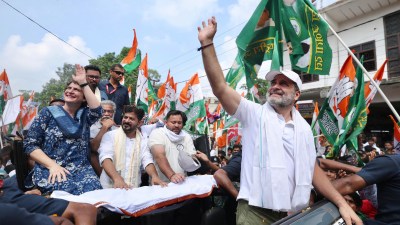Stay updated with the latest - Click here to follow us on Instagram
We should reject any linkage between religion and terrorism: Narendra Modi tells East Asia Summit
He also referred to challenges of close link with drug trafficking, arms smuggling and money laundering.
 Prime Minister Narendra Modi.
Prime Minister Narendra Modi.
Prime Minister Narendra Modi unequivocally rejected any linkage between religion and terrorism, even as he made a strong pitch for a “genuine international partnership” against all forms of terrorism.
In his address at the East Asia Summit here on Thursday morning, PM Modi said: “We support the East Asia Summit Declaration on the Islamic State. At the same time, comprehensive response against terrorism requires a genuinely international partnership against all terrorism. Those who believe in humanity must come together. We should also reject any linkage between religion and terrorism.”
 Modi meets leaders at ASEAN
Modi meets leaders at ASEAN
Modi also referred to the increasing challenges of terrorism and extremism and the “close link with drug trafficking, arms smuggling and money laundering”.
While making a strong pitch for increased international cooperation on energy partnership, especially in the area of solar energy, and in combating pandemics, Modi also reiterated the responsibility of all nations in following “international law and norms on maritime issues” and also called for a “balanced Regional Comprehensive Economic Partnership Agreement” that gives equal emphasis to goods and services.
 Prime Minister Narendra Modi (L) seen at the back as US President Barack Obama and Chinese Prime Minister Li Keqiang gesture as they walk after posing for a group photo with leaders of Association of Southeast Asian Nations (ASEAN) and related summits ahead of a gala dinner at Myanmar International Convention Center in Naypyitaw, Myanmar on Wednesday. (Source: PTI)
Prime Minister Narendra Modi (L) seen at the back as US President Barack Obama and Chinese Prime Minister Li Keqiang gesture as they walk after posing for a group photo with leaders of Association of Southeast Asian Nations (ASEAN) and related summits ahead of a gala dinner at Myanmar International Convention Center in Naypyitaw, Myanmar on Wednesday. (Source: PTI)
“Over the last eight Summits, we have made progress in a number of areas… In the same vein, we should also start major initiatives on energy partnership, for example, in the area of solar energy, with the objective of bringing affordable clean energy within the reach of all,” Modi said in his address.
In the backdrop of ASEAN nations such as the Philippines dragging their feet on ratifying a crucial free trade pact with Indian on services, Modi reiterated the need for a “balanced Regional Comprehensive Economic Partnership Agreement” that gives equal emphasis to goods and services.
Against the backdrop of China’s increasing belligerence over maritime disputes with southeast Asian nations, Modi underscored the point that “all nations have a responsibility to follow international law and norms on maritime issues” and that he “hoped for an early conclusion of a code of conduct to resolve the matter”.
On the specific issue of maritime security in the South China Sea, he said: “In a world of interdependence and globalization, there is no option but to follow international laws and norms. This also applies to maritime security. For this reason, following international law and norms is important for peace and stability in South China Sea as well”.
This, he said, also includes the 1982 UN Convention on Law of the Sea, which should be the basis for resolving disputes peacefully. We also hope that the efforts to conclude a Code of Conduct on South China Sea by a process of consensus would be successful soon.
He also said that Ebola has “once again highlighted the importance of international cooperation in combating pandemics”.
“India has made a contribution of $12 million in the efforts against Ebola. We also have 251 police personnel, including 104 women personnel, as part of the UN Mission in Liberia. They have all remained on duty in Liberia,” he added.
Reiterating his government’s resolve to turn its ‘Look East Policy’ into an ‘Act East Policy’, Modi referred to the East Asia Summit as “an important pillar of this policy”.



- 01
- 02
- 03
- 04
- 05






























